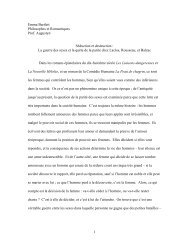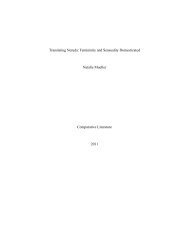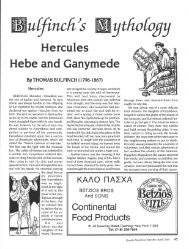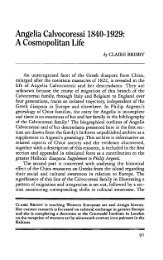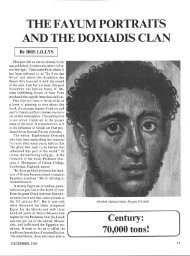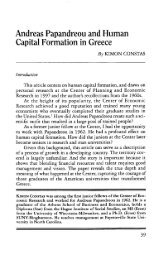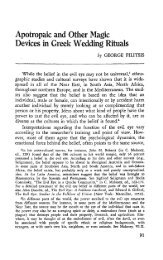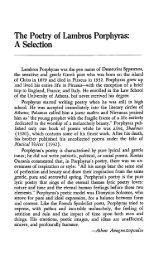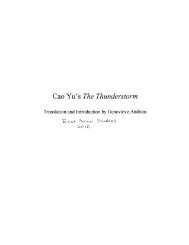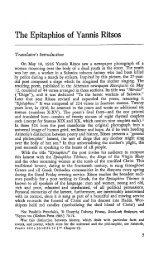Mythistorema - Triceratops Home
Mythistorema - Triceratops Home
Mythistorema - Triceratops Home
You also want an ePaper? Increase the reach of your titles
YUMPU automatically turns print PDFs into web optimized ePapers that Google loves.
62<br />
JOURNAL OF THE HELLENIC DIASPORA<br />
without any mention of the Erinyes." The end of Seferis' poem is closer<br />
to the version of Euripides, in which the Erinyes do not forgive Orestes.<br />
In Euripides' Electra the Dioskouroi advise Orestes after his act to go<br />
away in order to save himself from the menace of the Erinyes." In<br />
Seferis' poem the Furies appear at the end:<br />
. . . you cannot<br />
Escape the sea which cradled you, for which you turn and search<br />
In this moment of contest, among the breathing of horses,<br />
With the reeds that used to sing in autumn to a Lydian mode,<br />
The sea that you cannot find again, run as you may,<br />
Turn as you may, lap after lap, in front of the black<br />
Eumenides who are bored and cannot forgive.<br />
There is no absolution for his modern Orestes. The sea haunts him like<br />
the Furies, in the same way that Cavafy's persona is haunted by the city."<br />
And just as Cavafy's protagonist cannot find a new city, a new sea, so<br />
the modern Orestes cannot reach the sea he is searching for.<br />
Evidently, the sea he cannot escape from and the sea he is searching<br />
for cannot be the same. There are two different seas: the sea he cannot<br />
escape from is the fate of the Atreus family, the perpetuation of crime;<br />
while the sea he is searching for is the calm and balance, the element of<br />
rebirth and regeneration. For the modern Orestes, the sea that cradled<br />
him may be a metaphorical sea, probably some early erotic experiences<br />
that spoiled his life at the time he believed in the omnipotence of the<br />
body. There are some references to this aspect of the sea in other poems<br />
of Seferis, for instance:<br />
Who wants to bathe in the waters of Proteus now?<br />
We sought in our youth the metamorphosis<br />
With desires that flashed like big fishes<br />
"Chorus: House of Atreus! thou hast passed<br />
Through the fire and won at last<br />
Freedom, perfected today<br />
By this glorious essay.<br />
(11. 1507-10)<br />
"Castor: These shall find spousal-solace:—up be doing;<br />
You hell-hounds flee, till thou to Athens win.<br />
Their fearful feet pad on thy track pursuing,<br />
Demons of dragon talon, swart of skin,<br />
Who batten on mortal agonies their malice.<br />
(11. 1342-6)<br />
""You won't find another country, won't find another [sea) /[The} city will<br />
pursue you."<br />
Seferis writes that Cavafy's cities "follow men like Erinyes." Then he quotes<br />
Cavafy's self-comment "The city, an imaginary one, will follow him, pass him, and<br />
wait for bim," and adds, "like death in oriental fairytales." Essays, 1:414-5.



